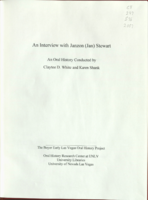Search the Special Collections and Archives Portal
Search Results

Transcript of interview with John Graves by Hank Baran, March 1, 1987
Date
Archival Collection
Description
On March 1, 1987, Hank Baran interviewed John Graves (born February 21st, 1938 in San Diego, California). This interview covers the gaming industry overall, and also highlights, women in gaming, more specifically. Mr. Graves also discusses the hotels on the Las Vegas Strip, McCarran Airfield, and golfing in Southern Nevada.
Text

Transcript of interview with Colleen Gregory by Tim Waters, April 6 & 7, 1976
Date
Archival Collection
Description
On April 6 and 7, 1976, Tim Waters interviewed Colleen Gregory (born 1928 in Santa Clara, Utah) about her life in Southern Nevada. Gregory first talks about her original move to Las Vegas, her early education, school activities, and her college education. She also talks about the first banks, Helldorado, the atomic testing, and environmental changes. Other topics covered include Howard Hughes, Western-style influences, first properties on the Strip, World War II, racial prejudice, and changes she has noticed during her career in banking.
Text

Transcript of interview with Ethel S. Hatch by P. Kohlman, November 24, 1975
Date
Archival Collection
Description
On November 24, 1975, collector P. Kohlman interviewed housewife, Ethel S. Hatch (born April 11th, 1914 in Valentine, Texas) in her home in Las Vegas, Nevada. This interview covers the history of Las Vegas from 1939 to 1975. Mrs. Hatch also talks about ranching in Nevada, Rex Bell, development on the Strip, the first hotels, and early local shopping culture. She refers to Block Sixteen as Block Thirteen when discussing the Red Light District. The interview concludes with discussion surrounding tree-lined streets, the Helldorado Club, and Fremont Street.
Text

Transcript of interview with Leander Fields Hayes by Mark Kevin Ryhlick, March 13, 1981
Date
Archival Collection
Description
On March 13, 1981, collector Mark Kevin Ryhlick interviewed local technician, Leeander Fields Hayes (born on May 23rd, 1907 in Salt Lake City, Utah) in his home in Las Vegas, Nevada. This interview covers the history of entertainment in Las Vegas from the mid-forties to 1958. Brother Hayes, as he requests the collector to call him, specifically covers the local live music and comedy scenes. He also touches on the topic of segregation and how Black entertainers, such as Lena Horne, were treated when they came to perform in Las Vegas, Nevada.
Text

Transcript of interview with Ruth Hazard by John Neal, March 8, 1975
Date
Archival Collection
Description
On March 8, 1975, John Neal interviews Ruth Hazard (birthdate unknown, 67 years old) in her home about her memory of how Southern Nevada has changed economically. Hazard goes in-depth about her knowledge of municipal politics and her husband’s friendships with a number of Nevadan politicians. Hazard also briefly talks about her fascination with the above-ground atomic tests, speakeasies during Prohibition, and local anxieties about Las Vegas “losing its identity.”
Text

Transcript of interview with Emma Ellsworth by Clark Ellsworth, March 5, 1980
Date
Archival Collection
Description
On March 5, 1980, Clark Ellsworth interviewed his grandmother, Emma Ellsworth (born 1902 in Payson, Utah) about her experiences in Southern Nevada. Ellsworth first talks about growing up in Utah and getting married before moving to Pioche, Nevada during the Great Depression. She also talks about bringing up a family in Las Vegas as well as her and her husband’s work in running Beneficial Life, a life insurance business, in Las Vegas. Ellsworth also talks about the Mormon churches in Las Vegas, the schools her children attended, and the number of grandchildren and great-grandchildren she had at the time.
Text

Transcript of interview with Stella Fleming by Suzanne Wright, February 24, 1979
Date
Archival Collection
Description
On February 24, 1979, Suzanne Wright interviewed Stella Fleming (born December 1, 1897 in Victoria, Canada) about her experiences as a Las Vegas, Nevada resident and as a worker in the welfare department in Clark County. Fleming first talks about some of her work in welfare and specifically the early practices of the welfare administration. She also discusses her work as it related to the Works Progress Administration, the American Red Cross, and the Nevada Emergency Relief Program. Fleming also provided some anecdotes about her experiences in that field before moving on to discuss some of the historical aspects of Las Vegas, such as the atomic testing, specific landmarks and locations, and the development of the city.
Text

Transcript of interview with Dorothy Ross Fletcher by Sharon Hildebrandt, June 26, 1975
Date
Archival Collection
Description
On June 26, 1975, Sharon Hildebrandt interviewed Dorothy Ross Fletcher (born 1936 in Las Vegas, Nevada) about growing up in and living in Southern Nevada. Fletcher first talks about that various towns in which she lived while growing up before discussing the schools she attended. She also discusses the changes in schools, her involvement in politics, church activity, gambling as a recreational activity, and prominent visitors who came to Las Vegas. Fletcher also talks about living in Nevada during World War II, the atomic testing, environmental changes and extreme weather, and the social changes in Las Vegas. The latter part of the interview involves discussion of real estate, the introduction of air conditioning for cooling, changes on the Las Vegas Strip, recreational activities available to youth in Las Vegas and the increase in the nonnative population.
Text

Transcript of interview with Jan Stewart by Claytee White, June 28, 2010
Date
Archival Collection
Description
In 1901, Jan Stewart's grandfather William T. Stewart brought his family to Alamo, Nevada in Lincoln County and about 90 miles north of Las Vegas to ranch. Soon he and his wife were operating a livery stable. One of his customers was an executive with the Union Pacific Railroad for whom he provided transportation to Las Vegas, where the railroad owned a ranch referred to as the Old Ranch. In this narrative Jan recounts how his grandfather and later his father became managers of the Old Ranch and lived a just a few dozen yards from the Old Mormon Fort, a historic Las Vegas landmark. In addition to sharing stories of his family's history, he describes how the ranch was a unique place to group up, brought the family in contact with many community people and an occasional celebrity.
Text

Transcript of interview with Breck Wall by Claytee White, July 3, 2003
Date
Archival Collection
Description
Breck Wall grew up tough and honed that toughness into solid business acumen. He also grew up talented and that talent took him to movie sets in Los Angeles and allowed him to produce shows in Dallas, New York, Tahoe, and Las Vegas. Though his family became nonexistent early in his life, he formed his own broad family from a group of faithful friends around the country. One special friendship makes this interview worth reading — the one with Jack Ruby. Wall's talent though is the primary reason that this interview is good history. He did many shows and had up to five running simultaneously. The creative process was the fun part that allowed him to produce Passion , Alias, and Night Beat among many others. Bottoms Up is his signature production and has been at several venues in Las Vegas for the past 40 years. Breck Wall is living a full and interesting life. A good example is a phone call from The London Times'. "Mr. Wall?" 1 said, "Yes." He said, "Are you aware that your best friend, Jack Ruby, just shot Oswald?" I said, "What" I was in shock. I said, "No I'm not." And I talked to him very briefly,and I hung up the phone." The phone continued to ring as calls came in from the Dallas Morning News, The Washington Post, The New York Times, etc, etc.
Text
